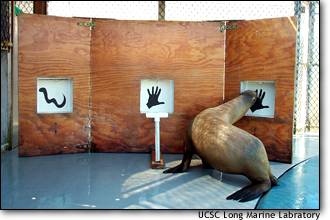![]()
|
Sea Lion’s Memory Boggles The Mind |
|
 |
A California sea lion named Rio aces a cognitive test she mastered a decade earlier: In this experiment, Rio quickly matches two patterns to earn a fish reward -- remembering the method she learned years before. |
|
A middle-aged Californian sea lion called Rio who remembered a complicated trick for ten years without ever practicing it has astounded her trainers and may shake up the world of animal science, researchers say. Shown cards with designs on them, Rio — at 16 a good age for a sea lion in captivity — picked out matching pairs without hesitation, in return for a reward of a fish. She first learned to recognize pairs when she was 6, but spent the next 10 years learning new tasks, without a single reminder of this older one. Scientists have done little research into the long-term memory of animals, and many assumed it is relatively limited. However, researchers said Rio’s astonishing response may force a rethink of how animal minds function. “It was mindboggling. We thought she would lose something because she was not exposed to any of this material for 10 years,” said Ron Schusterman, one of the two scientists who trained Rio. He said he had expected the problems of limited mental storage capacity. He anticipated Rio would probably have lost some of her old problem-solving skills, because of the distractions and challenges of learning new tasks. Schusterman and his research partner Colleen Reichmuth Kastak are marine biologists from the University of California at Santa Cruz who have been working with Rio for more than a decade to investigate how sea lions perceive the world. They originally taught Rio to recognize matching shapes and patterns because they were investigating whether she could learn abstract concepts, in this case, "sameness." They decided to test her long-term memory 10 years later, when they realized very little research had been done into long-term memory in animals. By the time she was tested for long-term memory, Rio was middle-aged for a sea lion in captivity (the animals usually live for 25 - 35 years), yet her memory appeared to be intact. When presented with a series of new shapes, Rio needed no reminders of her old skills and immediately applied the "sameness" concept she learned 10 years previous. Our animals’ memories, in terms of visual cueing at any rate, are at least as good as elephants,” Schusterman said. “In the wild as well, they have excellent memories; for their mother’s voice, for where they were born, and among males they have great memories for their territories,” he said. Schusterman said the pair plan to go on and research Rio’s memory of non-visual stimuli, like sounds and smells. He emphasized that the experiments with Rio didn’t necessarily indicate that sea lions have better memories than other species — since so little research has been conducted on the subject. As well as shaking up what biologists think about long-term animal memory, Schusterman said their results are also important because they help prove animals can think, even though they cannot express their thoughts in language. The research may give clues to how language developed in human beings. |
|
![]()
< Animals > < Environmental Science >